Best Accredited Investments—Top Picks
|
Primary Rating:
4.6
|
Primary Rating:
4.7
|
Primary Rating:
4.7
|
Primary Rating:
4.5
|
|
Minimum Investment: $1,000.50
|
Minimum Investment: $50,000
|
Minimum Investment: $5,000
|
Minimum Investment: $10,000
|
The Best Investment Opportunities for Accredited Investors
We’ve reviewed several investments worth considering as an accredited investor. These represent some of the best options available right now.
1. Pacaso (Invest in the Real Estate Investing App)
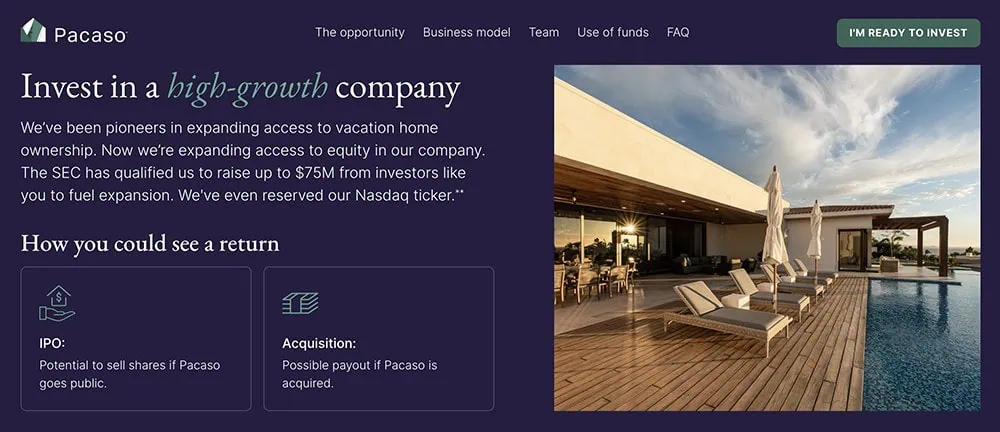
- Minimum investment to start: $1,000.50
- Type of investor: All investors
Pacaso is a real estate app that allows people to buy partial interests in vacation homes in more than 40 markets, including Italy, the U.S., Mexico, and the Caribbean. Unlike timeshares, in which buyers are effectively just purchasing the right to use the home during specific periods, Pacaso buyers are purchasing equity in the home and can benefit from any appreciation in its value.
And the app has opened up a new investment opportunity: the company itself.
Pacaso is attempting to raise more than $56 million in new funding by offering up “Class D” common stock, which is available to both accredited and non-accredited investors alike, at a minimum investment of just over $1,000.
Like with most stock, Pacaso Class D shares allow owners to benefit from any growth in the company. Pacaso makes money by selling homes to co-owners, earning commissions when co-owners resell shares of property, property management fees, and financing services. The company doesn’t have the same reporting requirements as U.S.-listed companies, but a few selected stats from its 2024 financial report include:
- Gross real estate transacted and associated service fees: +16% YoY, to $164.5 million
- Adjusted gross profit excluding the impact of Whole Homes: +18% YoY, to $23.6 million
- Adjusted EBITDA (earnings before interest, taxes, depreciation, and amortization) loss: -24% YoY, to -$20.4 million
Pacaso’s stated bull case? It currently only has less than 1% penetration in what it believes is a massive, $1.3 trillion total addressable market (TAM) for luxury vacation home ownership. While it was previously working on national brand awareness, the company says it’s refocusing on its core: “luxury homes in luxury markets for the [high-net-worth] customer.”
Just note that Pacaso is still a private company*, so if it does enjoy growth, you won’t be able to sell those shares as easily as you would publicly traded stock like what you invest in through a brokerage—instead, you’d likely have to wait for “liquidity events” such as an initial public offering (IPO) or acquisition.
Use our link to learn more about the offering (including SEC filings) or to start investing today.
* Pacaso publicizes that it has “reserved its Nasdaq stock ticker,” but that is no guarantee that the company will go public, nor is it a sign that the Nasdaq has or will approve its listing.
- Pacaso, a fractional-ownership real estate app that allows people to invest in luxury vacation homes, is now open to accredited and non-accredited investors alike through a limited-time offering of its Class D stock.
- Class D shares allow investors to enjoy any potential growth from Pacaso, which has a presence in more than 40 markets worldwide, is raising money to continue expansion in the $1.3 trillion luxury vacation home ownership market.
- The company is still privately held, which means investors will likely only be able to sell stock in "liquidity events" such as an initial public offering or an acquisition.
- Accessible stock offering (non-accredited investors may participate)
- Reasonable minimum required investment (~$1,000)
- Highly differentiated way to invest in real estate
- Illiquid investment (investors likely will only be able to sell alongside an IPO or acquisition)
- Relatively scarce information and analysis available for research compared to public companies
2. First National Realty Partners (Grocery-Anchored Commercial Real Estate)

- Minimum investment to start: $50,000
- Type of investor: Accredited investors
First National Realty Partners (FNRP) is one of the fastest-growing vertically integrated CRE investment firms in the United States. It’s also focused on a very particular niche: grocery-anchored commercial real estate.
FNRP’s team leverages relationships with top-tier national-brand tenants—including Kroger, Walmart, and Whole Foods—to provide investors with access to institutional-quality CRE deals both on- and off-market. Unlike many of the other sites on this list, which are equity crowdfunding platforms, FNRP offers private placements that only an accredited investor can access.
They’ve helped thousands of investors increase their net worth and diversify their portfolios against market volatility through deals that yield steady cash flow.
FNRP also progresses from an entire investment lifecycle, from acquisition through disposition, 100% in-house. A large team of professionals filters through thousands of deals to choose a handful they believe will outperform their peers.
Unlike a traditional real estate investment trust (REIT) or fund, you have the ability to pick the deals that best align with your investment needs, so you can use FNRP’s various offerings to build your own portfolio.
This relative exclusivity does, however, come with a high minimum investment of $50,000. Sign up to learn more about the opportunity and determine whether it makes sense for your investment goals.
Read more in our First National Realty Partners review.
- FNRP is the leading sponsor for grocery-anchored commercial real estate.
- FNRP has a nationwide focus and leverages relationships with the best national-brand tenants to bring accredited investors exclusive access to institutional-quality deals.
- FNRP provides partners with institutional-quality investments that achieve exceptional, risk-adjusted returns (12%-18% targeted average annual returns, of which, 8% is the targeted average annual cash distribution.)
- Uses the Dragnet Acquisitions Model - strong due diligence. FNRP looks at 1,000 deals and chooses just one. FNRP chooses only the best deals they believe offer the highest return for the absolute lowest risk.
- FNRP's entire investment cycle is 100% in-house and not outsourced like traditional private equity sponsors.
- Strong performance track record
- Unique investment niche (grocery-anchored CRE)
- High total shareholder return
- Only accessible to accredited investors
- High investment minimum ($50,000)
3. YieldStreet (Financial Securities in Real Estate, Art Finance & More)
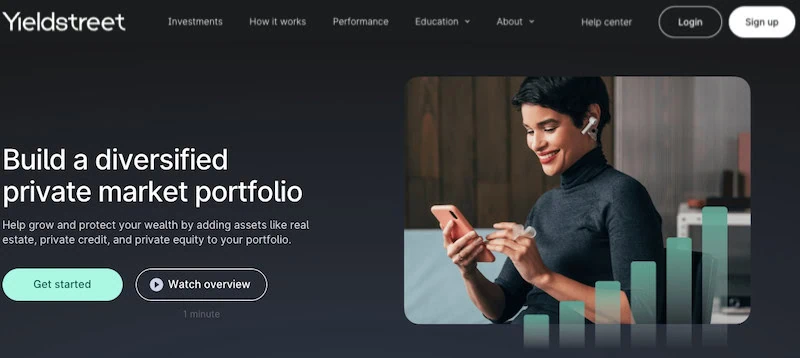
- Minimum investment to start: $2,500
- Type of investor: All investors
Alternative investments—basically, any asset that falls outside of stocks, bonds or cash—have become increasingly popular as fintech services open up previously closed markets to the individual retail investor. These opportunities have democratized numerous markets and unlocked previously inaccessible cash flows to pad your income.
Yieldstreet is one such platform, providing access to income-generating assets across several asset classes.
Yieldstreet is an alternative investment platform that provides you with income-generating opportunities. These investment options come backed by collateral, typically have low stock market correlation, and span various asset classes. Such asset classes include:
- Art finance
- Real estate
- Commercial finance
- Legal finance
- And more
Yieldstreet, which has been in business since 2015, has returned more than $600 million to its investors since its founding.
Historically, annual returns range anywhere from 3% to 18%, depending on the goal-based strategy. Yieldstreet offers predefined payment schedules (e.g., monthly or quarterly payments), and they may pay principal and interest upon the occurrence of certain events, such as settlement within a legal finance investment.
The durations of investment opportunities range from three months to seven years. Investment minimums start as low as $2,500, but can go well into five digits.
Yieldstreet technically is open to all investors, as non-accredited and accredited investors alike can participate in the Yieldstreet Prism Fund. However, you must be an accredited investor to participate in all other Yieldstreet offerings.
Learn more, and consider accessing these passive income investments, by opening an account today.
- Yieldstreet offers portfolio diversification through building passive income streams with alternative investments
- Typically have low stock market correlation
- Have short durations (6 months to 5 years)
- Low minimums (as low as $2,500)
- Backed by collateral to help protect your principal (over $600m in principal and interest payments returned to investors since 2015)
- Access to several alternative asset classes
- Low stock market correlation
- Low minimums compared to other accredited investment platforms
- Illiquid investments
- Some investments have lost money
- Most investments only available to accredited investors
4. EquityMultiple (Individual Commercial Real Estate Properties)

- Minimum investment to start: $5,000
- Type of investor: Accredited investors only
Some real estate crowdfunding platforms only allow you to invest in property portfolios. However, some platforms, such as EquityMultiple, also allow you to invest in individual properties—in this case, commercial real estate (CRE).
EquityMultiple carries a minimum $5,000 initial investment and comes with a limitation on the type of investors who can participate: accredited investors. However, those investors have access to individual commercial real estate deals, funds, and even diversified short-term notes.
Namely, EquityMultiple only allows its individual commercial real estate projects to receive investments from accredited investors.
For those interested in learning more about EquityMultiple, consider signing up for an account and going through their qualification process.
- EquityMultiple is a commercial real estate platform for accredited investors, providing investment opportunities in real estate funds, individual properties, and savings alternatives.
- EquityMultiple has a team boasting decades of real estate transaction experience. Their due diligence process whittles down a large selection of properties, accepting only 5% as target investments that they use to build a variety of portfolios that suit numerous investing objectives.
- The company has made over $425 million in distributions since its founding.
- Makes commercial real estate Investments accessible
- Intuitive website design
- High net total returns and distributions paid to investors
- Only available to accredited investors
- High investment minimum to begin
- Fee structure varies by investment, complex at times
5. Percent (Private Credit Investments)
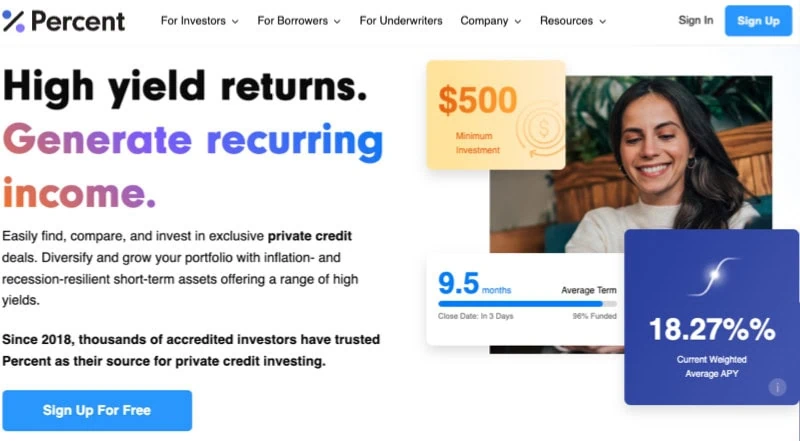
- Minimum investment to start: $500
- Type of investor: Accredited investors only
Percent is an investment platform designed for accredited investors who are interested in accessing private credit (non-bank lending).
You can diversify your portfolio with investments such as …
- small business lending in Latin America
- U.S. litigation finance
- Canadian residential mortgages
- merchant cash advances
Percent has built a way for retail accredited investors to access a wide range of private credit opportunities with a clear view into their performance through its innovative tools and comprehensive market data. That allows investors to make better-informed decisions, source and compare opportunities, and monitor performance with ease.
This platform also provides access to an alternative investment that’s a little more liquid than other alts, with some debt investments only lasting nine months, with liquidity available after the very first month in some cases.
The service targets annualized returns on unsecured notes between 12% to 18% on average and up to 20%. And while investment minimums vary, many Percent opportunities require only $500 to invest.
If you’re interested, visit Percent’s site to learn more or open an account.
- Access for accredited investors to private credit markets, which historically have been limited to institutional investors
- Shorter-term investments, with many durations between 9 months to several years, and liquidity available after the first month, if the borrower provides this option
- Lower minimums (most deals requiring only $500 to invest)
- Diversification, with access to small business lending in Latin America, U.S. litigation finance, Canadian residential mortgages, merchant cash advances, and more
- Uncorrelated returns with the stock market and a potential hedge on stock market volatility
- Greater liquidity than many alternative investments
- Low investment minimums
- Low stock market correlations
- Only accessible to accredited investors
6. CrowdStreet (Commercial Real Estate)
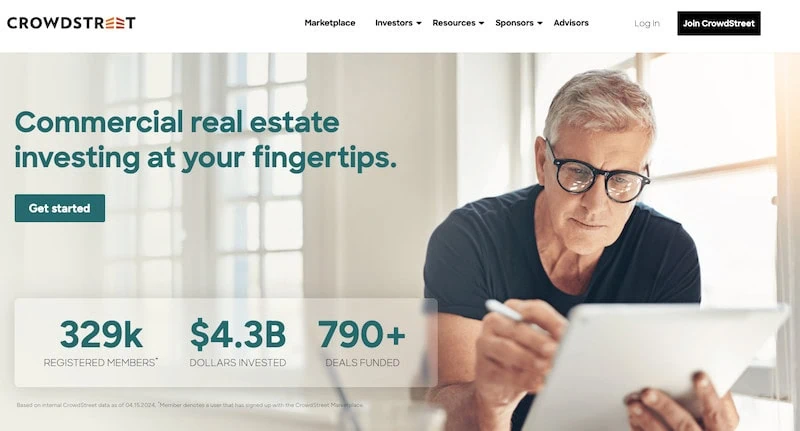
- Minimum investment to start: $25,000
- Type of investor: Accredited investors only
CrowdStreet is a real estate investment platform available exclusively to accredited investors looking to invest in commercial real estate for long periods.
The illiquid investments have performed well, but they require you to commit money for a few years, making you leave your money invested in these investments.
Further, CrowdStreet comes with a high minimum investment of $25,000, which shouldn’t come as a significant surprise. The platform caters to accredited investors, whereas platforms that allow non-accredited investors have low minimum investment requirements.
Depending on the type of project chosen, you might be receiving a return immediately through quarterly dividends on the commercial rental properties. You might also choose a project that takes a few years to provide you with money.
Editor’s note: Bloomberg has recently reported that investment funds in CrowdStreet allegedly have gone missing. According to court papers, millions of dollars ended up in accounts owned by Nightingale Properties, which CrowdStreet partnered with on the affected real estate transactions. CrowdStreet alerted regulators and brought in an independent manager to determine how the funds went missing. We are monitoring this developing story and may update our recommendations depending on the outcome.
- CrowdStreet is a real estate investment platform available exclusively to accredited investors looking to invest in commercial real estate for long periods.
- CrowdStreet comes with a high minimum investment of $25,000.
7. Fundrise (Real Estate)
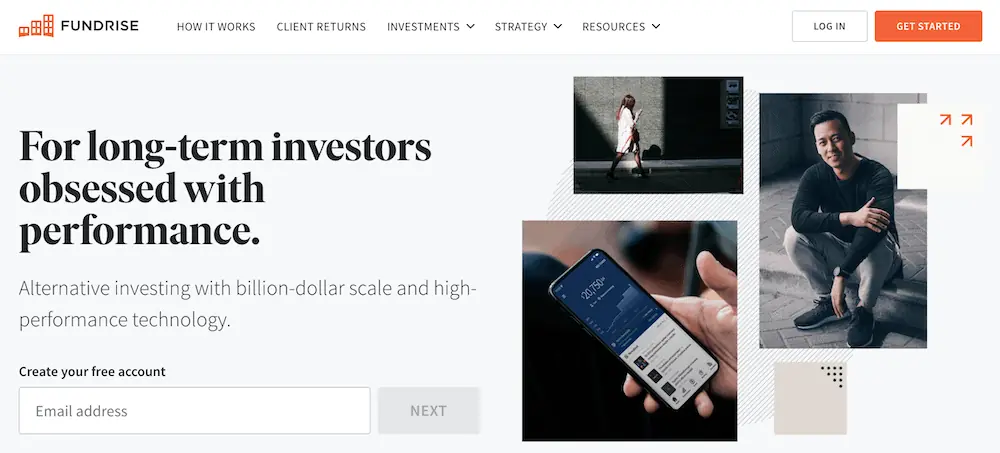
- Minimum investment to start: $10
- Type of investor: All investors
Fundrise is a popular online real estate investing platform that allows you to diversify through its numerous funds. Each fund holds a number of properties and is designed to provide varying levels of risk and income.
Among its options:
- Starter and Basic accounts: Investors can now access Fundrise for as little as $10. People who open a Starter account ($10-plus minimum investment) or Basic account ($1,000-plus) have their money automatically invested in the Flagship Real Estate Fund, which seeks a balanced objective of income and growth.
- Core, Advanced, and Premium accounts: Core ($5,000-plus), Advanced ($10,000-plus), and Premium ($100,000-plus) accounts all have access to more specialized strategies. The four primary funds, from low risk/income to high risk/income, are Fixed Income, Core Plus, Value Add and Opportunistic. These accounts also have varying amounts of access to Fundrise’s “eREITs.” Also, Advanced and Premium accounts may invest in the Fundrise eFund, which is a tax-efficient partnership that can also hold non-REIT-eligible assets with “unique potential.”
- Fundrise iPO: This “internet public offering” allows investors to buy a stake in Fundrise’s parent company, Rise Companies Corp.
- Innovation Fund: This fund does not invest in properties, but rather private high-growth technology companies. While the fund expects to focus primarily on late-stage companies, it can hold early- and late-stage private companies, as well as some public equities. (Fundrise would likely invest in these publicly traded companies prior to their IPO, or initial public offering.)
You do not need to be an accredited investor to invest in Fundrise, but several of its funds are closed to non-accredited investors.
Fundrise does share one thing in common with traditional commercial real estate investing, however: It can be highly illiquid. Fundrise itself states that “the shares you own are intended to be held long-term.” You can incur a penalty for selling any eREIT and eFund shares held for less than five years, for instance. Also, you can’t pick and choose what you sell—Fundrise’s “first in first out” system means that when you liquidate, the first shares sold will be those you’ve held the longest.
Even then, commercial real estate remains one of the best alternative investments you can own, and Fundrise helps people easily reap its rewards. Like with owning shares of publicly held real estate, private CRE price returns will often lag a major index like the S&P 500. But the passive income from real estate investing is nice: Since 2017, Fundrise’s average annual income return of 5.29% dwarfs that of both public real estate investment trusts (REITs, 4.1%) and the S&P 500 (2.0%). That includes a 1.5% total return (price plus dividends) in 2022 compared to double-digit losses for public REITs and the S&P 500.
Most of Fundrise’s real estate funds charge an annual 0.85% flat management fee. The Fundrise Innovation Fund, which provides access to venture capital-style investments, charges 1.85% annually.
Visit Fundrise to learn more about this alternative asset class or sign up today.
- Regardless of your net worth, you can now benefit from real estate’s unique potential for generating consistent cash flow and long-term gains with Fundrise starting as low as $10.
- Enjoy set-it-and-forget-it managed portfolios with standard Fundrise accounts, or actively select the funds you want to invest in with Fundrise Pro.
- Diversify your portfolio with real estate, private tech investing, or private credit.
- Low minimum investment ($10)
- Accredited and non-accredited investors welcome
- IRA accounts available
- Highly illiquid investment
Best Investment Opportunities for Accredited Investors
When you become an accredited investor, you are in the elite group of people who have the financial means and regulatory clearance to make investments that others cannot. This can mean exclusive access to hedge funds, venture capital firms, certain investment funds, private equity funds, and more.
The Securities and Exchange Commission argues by becoming an accredited investor, you possess a level of sophistication capable of building a riskier investment portfolio than a non-accredited investor. While not universally true, at the very least, you have demonstrated you have the financial resources to shoulder more risk should your investments unexpectedly fall in value.
Investment opportunities for accredited investors don’t need to be registered with financial authorities, meaning they come with fewer required disclosures and less transparency than registered securities available to non-accredited investors.
The line of thinking here is your qualification as a sophisticated investor means you understand financial risks, require less disclosure on unregistered securities, and believe investment opportunities for accredited investors offer suitable options for your investment funds.
Below, we cover what an accredited investor is and how to become one.
What Is an Accredited Investor?
Accredited investors include high-net-worth individuals (HNWIs), banks, insurance companies, securities brokers, and trusts.
An accredited investor may trade securities that do not require registration with financial authorities, like the Securities and Exchange Commission.
The Securities and Exchange Commission believes if you meet at least one of the accredited investor requirements (covered below), you don’t need the financial protection provided by regulatory disclosure filings many of their non-accredited counterparts might need to protect investors.
Many investment firms choose to offer securities directly to this investor class through a private fund or another investment vehicle. These opportunities for accredited investors typically come through private placements.
These types of financial arrangements entail potential risks not seen in traditional investments. Therefore, authorities want to ensure an accredited investor has the financial resources and sophistication to understand these risky ventures before proceeding.
How Does the Securities and Exchange Commission Define an Accredited Investor?
While the accredited investor definition recently changed—from one which usually meant high-net-worth/high-income individuals to now one which focuses on investor experience and knowledge—it typically skews more towards investors with financial resources and familiarity.
That said, the new amendments from the Securities and Exchange Commission (SEC) allow investors to qualify as accredited investors based on defined measures of professional knowledge, experience or certifications in place of the existing tests for income or net worth.
These tests for financial resources include having an aggregate net worth of over $1,000,000 and earning over $200,000 in each of the two most recent years or joint income with that person’s spouse over $300,000 in each of those years with a reasonable expectation of reaching the same income level in the current year.
Knowledgeable employees who work for certain private funds can also participate as accredited investors.
This article will explore how your net worth, income, employment, certification or status as a private business development company or organization with assets exceeding certain thresholds may become a factor when considering what types of investments you can buy.
How Do You Become an Accredited Investor?
To become an accredited investor, you must meet one of the following standards:
- You have a net worth (or joint net worth) exceeding $1,000,000 (excluding your primary residence).
- You are part of an association or trust with assets exceeding $5,000,000.
- Your annual income has exceeded $200,000 in each of the previous two years, and you expect to make the same amount this year.
- You must exceed $300,000 of joint income if you have a spouse.
Once you achieve these milestones, you have access to accredited investments through achieving accredited investor status. This allows you to invest in investment opportunities like:
- private placements
- online investment platforms catering to accredited investors
- venture capital
- hedge fund opportunities
- private equity
- real estate deals and certain real estate investments
- convertible investments
When considering alternative investments for accredited investors, it is essential to look at them through the lens of risk and return, which varies depending on your current financial situation. It would help if you also held other considerations like portfolio diversification and liquidity.
To help with this decision-making process, we’ve created the list of investment opportunities for accredited investors that might be right for you. Of note, traditional investments like stocks and bonds can still present great options for your financial portfolio.
Related Accredited Investor Questions
What can I invest in as an accredited investor?
As an accredited investor, you can invest in everything a non-accredited investor can buy. Still, you also have access to unregistered securities like those purchased by hedge funds, venture capital firms, angel investors and more.
Many of the assets available to an accredited investor fall under Regulation D Offerings (or “Reg D” for short) under the Securities Act of 1933.
This provides several exemptions from the registration requirements, allowing companies to offer and sell their securities without registering them with the SEC.
As mentioned above, this can mean a variety of private placements and other investments:
- Asset-backed investments: Investments offered directly to investors secured by a firm’s assets. In the event of default, these investors would have a legal claim to the firm’s assets.
- Interval funds: While similar to mutual funds in that they pool investors’ money together to purchase a common basket of assets, these professionally managed funds don’t require a daily reporting of net asset value (NAV) and only allow designated periods (or intervals) to transact. The reasoning is that fund managers have more leeway when making investment decisions as they have more certainty they will have capital available to the investment company.
- Hedge funds: A hedge fund takes investor money and uses it to make non-traditional investments or use exotic investment vehicles to attempt beating the stock market. Qualified investors commit capital to a hedge fund and allow them to use various investment strategies for their money. Typically your income level needs to be elevated, or you need a high net worth to contribute money to a hedge fund.
- Private equity funds: Private equity funds invest in businesses and do not have this company publicly available to other investors. This differs from stocks that trade on an organized exchange, where millions of investors can buy and sell shares of stock. Private equity is a form of funding available from high net worth individuals and firms.
You can also consider investments like venture capital, angel investing, real estate deals and crowdfunding.
Do accredited investors get higher returns?
Not necessarily. While accredited investor status requires you to have more financial resources at your disposal, accredited investors do not automatically earn higher returns than non-accredited investors.
Depending on the type of investments available through a private fund or asset class, an accredited investor may earn higher returns stemming from an illiquidity premium.
This means an investor expects to earn higher returns than those available through conventional securities like stocks, mutual funds, or exchange-traded funds because they lose access to their cash until the investment matures.
Is it worth it to become an accredited investor?
Becoming an accredited investor allows you to invest in more assets than the investing public. Several companies specifically establish special investment pools catering to accredited investors, as this entails less regulatory burden and hassle with registering securities with the appropriate regulatory authorities.
Becoming an accredited investor can provide you with more opportunities to invest your money. However, being an accredited investor does not necessarily mean having higher returns. In exchange for forking over your money to non-traditional assets, you should expect that your returns will outperform the market as a whole.
Often, becoming an accredited investor changes little for your investing concerns. You want to preserve your day-to-day lifestyle through asset preservation or grow your funds through wealth accumulation. Investing as an accredited investor does require you to participate in accredited investor-only deals. Choosing to invest in the real estate market, stocks, or other standard types of assets is prudent.
When deciding whether you should invest in accredited investor opportunities, you should balance the trade-off you make between higher-reward potential with the lack of reporting requirements or regulatory transparency.
What are the risks of investing through private placements?
It must be said that private placements entail higher levels of risk and can quite often represent illiquid investments. As with other investments, you can lose some or all of your investment.
Specifically, nothing here should be interpreted to state or imply that past results are an indication of future performance nor should it be interpreted that FINRA, the SEC or any other securities regulator approves of any of these securities.
Additionally, when reviewing private placements from sponsors or companies offering them to accredited investors, they can provide no warranties expressed or implied as to accuracy, completeness, or results obtained from any information provided in their discussions or presentations.
Investing in private securities transactions bears risk, in part due to the following factors:
- there is no secondary market for the securities
- there is credit risk
- where there is collateral as security for the investment, its value may be impaired if it is sold.
The company should provide information to you through a document called the Private Placement Memorandum (PPM) that offers a more detailed explanation of expenses and risks associated with participating in the investment.
Interests in these deals are only offered to persons who qualify as Accredited Investors under the Securities Act, and a Qualified Purchaser as defined in Section 2(a)(51)(A) under the Company Act or an eligible employee of the management company.
Lastly, the presentations shown in this article do not constitute an offer to sell or a solicitation of an offer to buy Interests in any jurisdiction to any person to whom it is unlawful to make such offer or solicitation in such jurisdiction. There will not be any public market for the Interests.

















